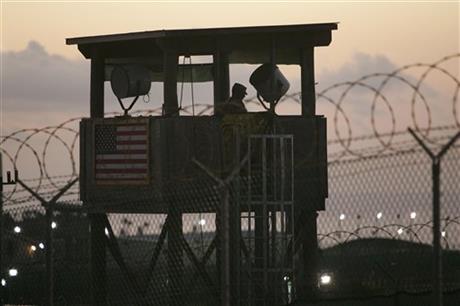
By BEN FOX
FILE – In this Dec. 7, 2006 file photo reviewed by the U.S. Military, a U.S. soldier keeps watch from a guard tower overlooking Camp Delta detention center on Guantanamo Bay U.S. Naval Base in Cuba. Lawyers for Guantanamo prisoners charged in the Sept. 11 attack say the FBI has questioned more people who work as support staff on their legal teams than previously disclosed, a development that may prompt a new detour in an already snarled case when the war crimes tribunal reconvenes Monday at the U.S. base in Cuba. A judge will consider a delay in the proceedings in a hearing on Monday, June 16, 2014. (AP Photo/Brennan Linsley, File)
James Connell, Sterling Thomas
James Connell, left, the civilian defense lawyer for Ammar al-Baluchi, and Air Force Lt. Col. Sterling Thomas, his military lawyer, speak with reporters about FBI questioning of the defense teams staff in the Sept. 11 war crimes case, on the Guantanamo Bay Naval Base, Cuba, Sunday, June 15, 2014. Lawyers for the defendants say the FBI investigations of defense team staff are part of a pattern of interference in their ability to represent the men that included monitoring on written communications with their clients and the revelation in February 2013 that the rooms in which they meet with clients contained microphones apparently disguised to look like smoke detectors. A judge will consider a delay in the proceedings in a hearing on Monday, June 16. (AP Photo/Ben Fox)
Prev
1 of 2
Next
GUANTANAMO BAY NAVAL BASE, Cuba (AP) — Lawyers for Guantanamo prisoners charged in the Sept. 11 attack say the FBI has questioned more people who work as support staff on their legal teams than previously disclosed, a development that may prompt a new detour in an already snarled case when the war crimes tribunal reconvenes Monday at this U.S. base.
The trial by military commission of the five prisoners was derailed in April when the attorney for one defendant revealed that a member of his support staff had been questioned at home by the FBI and asked to provide information on others who work for the defense.
Since then, lawyers say they have learned that at least three other staffers have been questioned in two separate investigations over the past year. They want the judge to conduct a full hearing with witnesses into the issue despite government assurances that the investigations have been closed.
“The facts as we know them give rise to a potential conflict of interest, and when that happens, U.S. Supreme Court decisions are clear: The judge has an obligation to conduct a thorough inquiry,” said David Nevin, the lead civilian attorney for defendant Khalid Sheikh Mohammed.
Little is publicly known about the two investigations. Lawyers say the FBI questioned an investigator and a classified material analyst for the team representing defendant Ramzi Binalshibh; an investigator for defendant Mustafa al-Hawsawi; and a translator on the team representing Mohammed, who has portrayed himself as the mastermind of the terror attack on Sept. 11, 2001.
Prosecutors have said the FBI questioned the evidence technician as part of a preliminary investigation into the mishandling of classified evidence and the probe ended without charges, though the matter was referred to the Defense Department for possible further action.
The government is seeking to resume pretrial proceedings for the five prisoners, who face charges that include terrorism and murder for their alleged roles planning and providing logistics in the attack and could get the death penalty if convicted. Since their May 2012 arraignment, there have been 10 pretrial hearings in what officials have called the most complex terrorism trial in U.S. history.
Brig. Gen. Mark Martins, the chief prosecutor, said the case is making “methodical and deliberate movement” toward trial but no date has been set. “Delay is frustrating and I acknowledge that.”
Lawyers for the defendants say the FBI investigations of defense team staff are part of a pattern of interference in their ability to represent the men, including the monitoring of written communications with their clients and the revelation in February 2013 that the rooms in which they meet with clients contained microphones apparently disguised to look like smoke detectors.
They are seeking a weeklong hearing in August that would feature testimony from the FBI agents and the defense team members who were questioned as well as a former member of the prosecution team who now works as a senior FBI official. Prosecutors say it’s time to move on.
“The government’s position now is that having been caught with its hand in the cookie jar there is no problem because even though it ate the cookie, it put the lid back on the cookie jar,” said James Connell, an attorney for defendant Ammar al-Baluchi.



